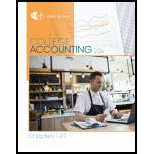
College Accounting, Chapters 1-27 (New in Accounting from Heintz and Parry)
22nd Edition
ISBN: 9781305666160
Author: James A. Heintz, Robert W. Parry
Publisher: Cengage Learning
expand_more
expand_more
format_list_bulleted
Question
Chapter 24, Problem 3SEB
(a)
To determine
Compute the profit margin for the period 20-2.
(b)
To determine
Compute the return on assets for the period 20-2.
(c)
To determine
Compute return on common stockholders’ equity for the period 20-2.
(d)
To determine
Compute earnings per share of common stock during the period 20-2.
Expert Solution & Answer
Want to see the full answer?
Check out a sample textbook solution
Students have asked these similar questions
Abc
Abc
What is the return on equity????
Chapter 24 Solutions
College Accounting, Chapters 1-27 (New in Accounting from Heintz and Parry)
Ch. 24 - A comparison of amounts for the same item in the...Ch. 24 - Prob. 2TFCh. 24 - Prob. 3TFCh. 24 - Prob. 4TFCh. 24 - Prob. 5TFCh. 24 - Prob. 1MCCh. 24 - Prob. 2MCCh. 24 - Working capital is a measure of (a) liquidity. (b)...Ch. 24 - Prob. 4MCCh. 24 - Prob. 5MC
Ch. 24 - Prob. 1CECh. 24 - Prob. 2CECh. 24 - Compute the following profitability measures for...Ch. 24 - Prob. 4CECh. 24 - Prob. 5CECh. 24 - Prob. 6CECh. 24 - Prob. 1RQCh. 24 - Prob. 2RQCh. 24 - Prob. 3RQCh. 24 - Prob. 4RQCh. 24 - Prob. 5RQCh. 24 - Prob. 6RQCh. 24 - Prob. 7RQCh. 24 - Prob. 8RQCh. 24 - Prob. 9RQCh. 24 - Prob. 10RQCh. 24 - Prob. 11RQCh. 24 - Prob. 12RQCh. 24 - Prob. 13RQCh. 24 - Prob. 1SEACh. 24 - Prob. 2SEACh. 24 - ANALY SIS OF PROFITABILITY Based on the financial...Ch. 24 - ANALY SIS OF LEVERAGE Based on the financial...Ch. 24 - Prob. 5SEACh. 24 - Prob. 6SEACh. 24 - Prob. 7SEACh. 24 - Prob. 8SPACh. 24 - Prob. 9SPACh. 24 - RATIO ANALYSIS OF COMPARATIVE FINANCIAL STATEMENTS...Ch. 24 - Prob. 1SEBCh. 24 - ANALYSIS OF ACTIVITY MEASURES Based on the...Ch. 24 - Prob. 3SEBCh. 24 - Prob. 4SEBCh. 24 - Prob. 5SEBCh. 24 - Prob. 6SEBCh. 24 - Prob. 7SEBCh. 24 - Prob. 8SPBCh. 24 - Prob. 9SPBCh. 24 - RATIO ANALYSIS OF COMPARATIVE FINANCIAL STATEMENTS...Ch. 24 - Prob. 1MPCh. 24 - This problem challenges you to apply your...
Knowledge Booster
Learn more about
Need a deep-dive on the concept behind this application? Look no further. Learn more about this topic, accounting and related others by exploring similar questions and additional content below.Similar questions
arrow_back_ios
SEE MORE QUESTIONS
arrow_forward_ios
Recommended textbooks for you
 College Accounting, Chapters 1-27AccountingISBN:9781337794756Author:HEINTZ, James A.Publisher:Cengage Learning,
College Accounting, Chapters 1-27AccountingISBN:9781337794756Author:HEINTZ, James A.Publisher:Cengage Learning, Financial AccountingAccountingISBN:9781337272124Author:Carl Warren, James M. Reeve, Jonathan DuchacPublisher:Cengage Learning
Financial AccountingAccountingISBN:9781337272124Author:Carl Warren, James M. Reeve, Jonathan DuchacPublisher:Cengage Learning Managerial AccountingAccountingISBN:9781337912020Author:Carl Warren, Ph.d. Cma William B. TaylerPublisher:South-Western College Pub
Managerial AccountingAccountingISBN:9781337912020Author:Carl Warren, Ph.d. Cma William B. TaylerPublisher:South-Western College Pub Cornerstones of Financial AccountingAccountingISBN:9781337690881Author:Jay Rich, Jeff JonesPublisher:Cengage Learning
Cornerstones of Financial AccountingAccountingISBN:9781337690881Author:Jay Rich, Jeff JonesPublisher:Cengage Learning

College Accounting, Chapters 1-27
Accounting
ISBN:9781337794756
Author:HEINTZ, James A.
Publisher:Cengage Learning,

Financial Accounting
Accounting
ISBN:9781337272124
Author:Carl Warren, James M. Reeve, Jonathan Duchac
Publisher:Cengage Learning

Managerial Accounting
Accounting
ISBN:9781337912020
Author:Carl Warren, Ph.d. Cma William B. Tayler
Publisher:South-Western College Pub

Cornerstones of Financial Accounting
Accounting
ISBN:9781337690881
Author:Jay Rich, Jeff Jones
Publisher:Cengage Learning
Financial ratio analysis; Author: The Finance Storyteller;https://www.youtube.com/watch?v=MTq7HuvoGck;License: Standard Youtube License